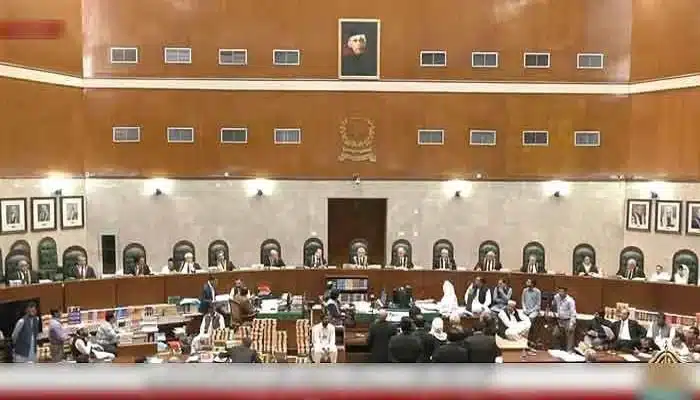court orders to fix plea against SC Practice and Procedure Ordinance
The LHC directs registrar office to fix petition for hearing.
Removes objection on plea of absence of relevant bench.
President Asif Ali Zardari on Friday approved ordinance.
LAHORE: The Lahore High Court (LHC) on Monday directed the registrar’s office to fix a plea challenging the Supreme Court (Practice and Procedure) Amendment Ordinance 2024 for hearing.
The court removed the objection of not having a relevant bench on the petition.
The plea was filed a couple of days after the federal cabinet approved the ordinance, which was approved by President Asif Ali Zardari as well hours after the cabinet’s green lighting it on September 20.
The cabinet, chaired by Prime Minister Shehbaz Sharif, had adopted the much-debated ordinance “through a circulation” after the Ministry of Law had sent it to the PM and cabinet on September 19’s night.
The ordinance said the court bench would look at the cases keeping in view the fundamental human rights and public importance.
As per the ordinance, each case will be heard on its turn otherwise reason will be furnished for its taking out of turn.
“Each case and appeal will be recorded and its transcript will be prepared, which will be available to the public,” it also stated.
Earlier, sources told The News that the ordinance would give the Chief Justice of Pakistan (CJP) additional power to appoint cases. The top judge would have the authority to nominate a judge as a member of a committee, if a member of the committee is absent, they said.
According to the Practice and Procedure Act, a three-member committee constitutes the benches. The sources had apprised the publication that the law ministry had prepared the amendment ordinance and forwarded it to the cabinet for approval.
Sub-clause 1 of the Act’s Section 2 has been incorporated in the law, according to which the Practice and Procedure Act Committee will fix the cases for hearing. The body will comprise the chief justice, the most senior judge and the judge nominated by the chief justice.
The ordinance also includes an amendment in Section 3 of the Act.
What is Supreme Court (Practice and Procedure) Act 2023?
The Pakistan Democratic Movement (PDM) passed the Supreme Court (Practice and Procedure) Act 2023, during the last days of its government to regulate the chief justice’s powers.
But they met a setback as even before the law was enacted on April 21, 2023, an eight-member bench constituted by then-CJP Umar Ata Bandial issued a stay order on it on April 13, 2023.
The law gave the power of taking sou motu notice to a three-member committee comprising senior judges including the chief justice. It further aimed to have transparent proceedings in the apex court and includes the right to appeal.
Regarding the constitution of benches, the law stated that every cause, matter or appeal before the apex court would be heard and disposed of by a bench constituted by a committee comprising the CJP and the two senior-most judges.
It added that the decisions of the committee would be taken by a majority.
Regarding exercising the apex court’s original jurisdiction, the Act stated that any matter invoking the use of Article 184(3) would first be placed before the committee.
On matters where the interpretation of the Constitution is required, the Act stated the committee would compose a bench comprising no less than five apex court judges.
About appeals for any verdict by an apex court bench that exercised Article 184(3)’s jurisdiction, the Act said that the appeal would lie within 30 days of the bench’s order to a larger SC bench. It added that the appeal would be fixed for hearing within a period not exceeding 14 days.
The Act additionally said that a party would have the right to appoint its counsel of choice for filing a review application under Article 188 of the Constitution.
Furthermore, it stated that an application pleading urgency or seeking interim relief, filed in a cause, appeal, or matter, shall be fixed for hearing within 14 days from the date of its filing.
However, the law had the provision that this right of appeal would also extend retrospectively to those aggrieved persons against whom an order was made under Article 184(3) prior to the commencement of the Act, but the court has struck it down.

